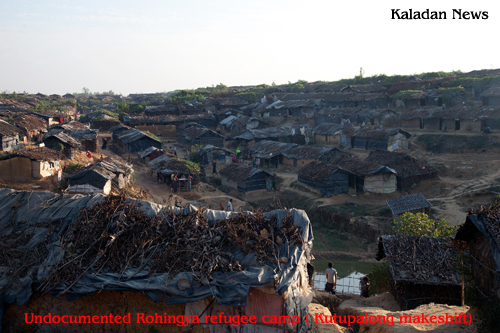The status of plans to repatriate Rohingyas back to Burma were unclear while Bangladesh and Burma renewed their commitment to establish physical connectivity when Foreign Minister Dipu Moni met with her Burmese counterpart U Nyan Win in Naypyidaw, Burma ...
Chittagong, Bangladesh: The status of plans to repatriate Rohingyas back to Burma were unclear while Bangladesh and Burma renewed their commitment to establish physical connectivity when Foreign Minister Dipu Moni met with her Burmese counterpart U Nyan Win in Naypyidaw, Burma, on January 21, according to a Foreign Ministry press release.
 Foreign Minister Dipu Moni is currently in Burma to attend the 13th BIMSTEC (Bangladesh India Myanmar Sri Lanka Thailand Economic Cooperation) Ministerial Meeting.
Foreign Minister Dipu Moni is currently in Burma to attend the 13th BIMSTEC (Bangladesh India Myanmar Sri Lanka Thailand Economic Cooperation) Ministerial Meeting.
The press release, however, did not mention Burma's response to the repatriation issue when Foreign Minister Dipu Moni proposed the issue of Burmese refugees' repatriation from Bangladesh and urged Burma to find a way for undocumented Burmese nationals in Bangladesh to go back to their country.
The Burmese authorities last year agreed to accept Rohingya refugees who are recognized by UNHCR from Bangladesh, but not those living as undocumented refugees.
"During my Myanmar visit (May 16–17, 2009), Myanmar leaders admitted that Rohingyas are Myanmarese and agreed to take them back," the Foreign Minister said in a press conference after visiting Burma and Bali in Indonesia for the 3rd Bali Regional Ministerial Conference on People Smuggling, Trafficking in Persons and Related Transnational Crimes.
"With limited resources, Bangladesh has done more than enough for the refugees from Myanmar for the last three decades, and now Myanmar must take back its own people."
"The refugee influx will not stop unless there is a qualitative change in Arakan State, in western Myanmar where the Rohingya people live.”
The repatriation of Rohingya refugees was a ‘three-decades-old crisis’ and an attempt was made to solve the problem through diplomatic channels, under an agreement signed on July 9, 1978, after the first influx of Burmese nationals into Bangladesh, the Foreign Minister, Dipu Moni said in a discussion meeting on Bangladesh-Burma relations on June 11, 2009.
“In the spirit of good neighbourly relations, Burma should take the refugees back after creating a friendly atmosphere, so that once the refugees are repatriated, they will be encouraged to stay on in their country.”
Bangladesh Home Minister Sahara Khatun said in Parliament on June 29, 2009 that the Rohingya issue still remains unresolved even though the government is trying to resolve the settlement of Rohingyas through regional and international intervention. The Bangladesh Parliament has been raising the issue of foreign nationals’ status living as illegal immigrants in the country for a long time. The Parliament wanted to know how Burmese authorities are planning to handle the issue.
“A few thousand Rohingyas are living in registered camps run by the United Nations High Commissioner for Refugees. Around 14,015 registered Rohingya refugees are staying at Kutupalong Camps and 8,589 in Nayapara Camp in Teknaf. An additional 12,000 Rohingyas live in the unregistered Leda Camp in Cox’s Bazaar, which is run with assistance from the European Union,” the Home Minister said.
According to local NGOs, more than 500,000 Rohingyas are living in the border area between Burma and Bangladesh, many of them blending in with the local community. The UN estimates up to 300,000 Rohingyas are living outside of camps.



